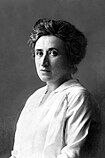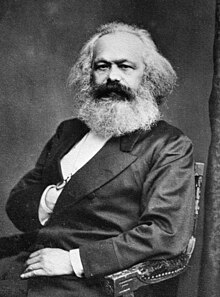The Socialism portal The socialist political movement includes political philosophies that originated in the revolutionary movements of the mid-to-late 18th century and out of concern for the social problems that socialists associated with capitalism. By the late 19th century, after the work of Karl Marx and his collaborator Friedrich Engels, socialism had come to signify anti-capitalism and advocacy for a post-capitalist system based on some form of social ownership of the means of production. By the early 1920s, communism and social democracy had become the two dominant political tendencies within the international socialist movement, with socialism itself becoming the most influential secular movement of the 20th century. Many socialists also adopted the causes of other social movements, such as feminism, environmentalism, and progressivism. ( Full article...) Selected article
Luxemburgism is a variant of
Marxist revolutionary theory based on the writings of
Rosa Luxemburg. According to
M. K. Dziewanowski, the term was originally coined by
Bolshevik leaders denouncing the deviations of Luxemburg's followers from traditional
Leninism, but it has since been adopted by her followers themselves.
Luxemburgism is a Marxist tendency within Libertarian Marxism which, while supporting the Russian Revolution, as Luxemburg did, agrees with her criticisms of the politics of the Bolsheviks.
Selected biography -Karl Marx (German: [maʁks]; 5 May 1818 – 14 March 1883) was a German-born philosopher, political theorist, economist, historian, sociologist, journalist, and revolutionary socialist. His best-known works are the 1848 pamphlet The Communist Manifesto (with Friedrich Engels) and his three-volume Das Kapital (1867–1894); the latter employs his critical approach of historical materialism in an analysis of capitalism, in the culmination of his intellectual endeavours. Marx's ideas and their subsequent development, collectively known as Marxism, have had enormous influence on modern intellectual, economic and political history. Born in Trier in the Kingdom of Prussia, Marx studied at the universities of Bonn, Berlin, and Jena, and received a doctorate in philosophy from the latter in 1841. A Young Hegelian, he was influenced by the philosophy of Georg Wilhelm Friedrich Hegel, and both critiqued and developed Hegel's ideas in works such as The German Ideology (written 1846) and the Grundrisse (written 1857–1858). While in Paris in 1844, Marx wrote his Economic and Philosophic Manuscripts and met Engels, who became his closest friend and collaborator. After moving to Brussels in 1845, they were active in the Communist League, and in 1848 wrote The Communist Manifesto, which expresses Marx's ideas and lays out a programme for revolution. Marx was expelled from Belgium and Germany, and in 1849 moved to London, where he wrote The Eighteenth Brumaire of Louis Bonaparte (1852) and Das Kapital. From 1864, Marx was involved in the International Workingmen's Association (First International), in which he fought the influence of anarchists led by Mikhail Bakunin. In his Critique of the Gotha Programme (1875), Marx wrote on revolution, the state and the transition to communism. He died stateless in 1883 and was buried in Highgate Cemetery. ( Full article...)General imagesThe following are images from various socialism-related articles on Wikipedia.
Did you know (auto-generated) -
Related portalsTopicsSubcategoriesWant to find an article related to socialism? Try browsing through any of the main
categories below:
Select [►] to view subcategories
Selected quotation
Participate!Everyone is welcome to participate in WikiProject Socialism, where editors collaborate to improve all aspects related to socialism on Wikipedia. Associated WikimediaThe following Wikimedia Foundation sister projects provide more on this subject:
Discover Wikipedia using
portals | ||||||
The Socialism portal The socialist political movement includes political philosophies that originated in the revolutionary movements of the mid-to-late 18th century and out of concern for the social problems that socialists associated with capitalism. By the late 19th century, after the work of Karl Marx and his collaborator Friedrich Engels, socialism had come to signify anti-capitalism and advocacy for a post-capitalist system based on some form of social ownership of the means of production. By the early 1920s, communism and social democracy had become the two dominant political tendencies within the international socialist movement, with socialism itself becoming the most influential secular movement of the 20th century. Many socialists also adopted the causes of other social movements, such as feminism, environmentalism, and progressivism. ( Full article...) Selected article
Luxemburgism is a variant of
Marxist revolutionary theory based on the writings of
Rosa Luxemburg. According to
M. K. Dziewanowski, the term was originally coined by
Bolshevik leaders denouncing the deviations of Luxemburg's followers from traditional
Leninism, but it has since been adopted by her followers themselves.
Luxemburgism is a Marxist tendency within Libertarian Marxism which, while supporting the Russian Revolution, as Luxemburg did, agrees with her criticisms of the politics of the Bolsheviks.
Selected biography -Karl Marx (German: [maʁks]; 5 May 1818 – 14 March 1883) was a German-born philosopher, political theorist, economist, historian, sociologist, journalist, and revolutionary socialist. His best-known works are the 1848 pamphlet The Communist Manifesto (with Friedrich Engels) and his three-volume Das Kapital (1867–1894); the latter employs his critical approach of historical materialism in an analysis of capitalism, in the culmination of his intellectual endeavours. Marx's ideas and their subsequent development, collectively known as Marxism, have had enormous influence on modern intellectual, economic and political history. Born in Trier in the Kingdom of Prussia, Marx studied at the universities of Bonn, Berlin, and Jena, and received a doctorate in philosophy from the latter in 1841. A Young Hegelian, he was influenced by the philosophy of Georg Wilhelm Friedrich Hegel, and both critiqued and developed Hegel's ideas in works such as The German Ideology (written 1846) and the Grundrisse (written 1857–1858). While in Paris in 1844, Marx wrote his Economic and Philosophic Manuscripts and met Engels, who became his closest friend and collaborator. After moving to Brussels in 1845, they were active in the Communist League, and in 1848 wrote The Communist Manifesto, which expresses Marx's ideas and lays out a programme for revolution. Marx was expelled from Belgium and Germany, and in 1849 moved to London, where he wrote The Eighteenth Brumaire of Louis Bonaparte (1852) and Das Kapital. From 1864, Marx was involved in the International Workingmen's Association (First International), in which he fought the influence of anarchists led by Mikhail Bakunin. In his Critique of the Gotha Programme (1875), Marx wrote on revolution, the state and the transition to communism. He died stateless in 1883 and was buried in Highgate Cemetery. ( Full article...)General imagesThe following are images from various socialism-related articles on Wikipedia.
Did you know (auto-generated) -
Related portalsTopicsSubcategoriesWant to find an article related to socialism? Try browsing through any of the main
categories below:
Select [►] to view subcategories
Selected quotation
Participate!Everyone is welcome to participate in WikiProject Socialism, where editors collaborate to improve all aspects related to socialism on Wikipedia. Associated WikimediaThe following Wikimedia Foundation sister projects provide more on this subject:
Discover Wikipedia using
portals | ||||||























































